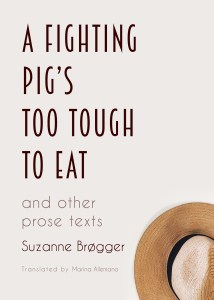 Suzanne Brøgger is a Danish icon. With her 1973 collection of essays Fri os fra kœrligheden (Deliver Us from Love) she put herself on the map as a powerful feminist voice and became the spokesperson for a whole generation of Scandinavian women. She wants change and challenges traditional boundaries of sexuality and gender in her work. In her early writings, there is a distinct polemic voice fighting for social transformation, but later on in her authorship, Brøgger becomes more philosophical, posing the big existential questions about human life. She fills her stories with herself, transgressing the line between fiction and autobiography, in order to convey the spirit of the age she is living in. But using herself as material has led to a lifetime of trying to balance the role of subject and object. Because in addition to being an author, Brøgger is a striking beauty with an aura of sensuality – a combination that has spurred curiosity and desire since she made her debut in the public sphere. However, it seems this has only prompted Brøgger to be more innovative, constantly reinventing herself and her writing, flouting generic conventions.
Suzanne Brøgger is a Danish icon. With her 1973 collection of essays Fri os fra kœrligheden (Deliver Us from Love) she put herself on the map as a powerful feminist voice and became the spokesperson for a whole generation of Scandinavian women. She wants change and challenges traditional boundaries of sexuality and gender in her work. In her early writings, there is a distinct polemic voice fighting for social transformation, but later on in her authorship, Brøgger becomes more philosophical, posing the big existential questions about human life. She fills her stories with herself, transgressing the line between fiction and autobiography, in order to convey the spirit of the age she is living in. But using herself as material has led to a lifetime of trying to balance the role of subject and object. Because in addition to being an author, Brøgger is a striking beauty with an aura of sensuality – a combination that has spurred curiosity and desire since she made her debut in the public sphere. However, it seems this has only prompted Brøgger to be more innovative, constantly reinventing herself and her writing, flouting generic conventions.
Brøgger’s collection of essays A Fighting Pig’s Too Tough to Eat is now out in a beautiful new reprint. It contains several essays, including ‘Who Needs Witches’ where she celebrates female power and the human body, and ‘The Love of Death’ which starts out with an allegorical train ride where a woman is either having sex or dying; Brøgger is investigating our fear, disgust and fascination with both phenomena. In the midsection of A Fighting Pig’s Too Tough to Eat, you will find a short novel with the same title. This novel is one of Brøgger’s most popular books and is about rural life in the small community Løve, interwoven with observations of the Cluny Tapestries, The Lady and the Unicorn. It is an exploration of the concepts of alterity, textuality and change and is divided into sections according to the senses, with chapter titles like ‘To Taste’ and ‘To Touch’.
We hope that you will enjoy this reprint and that it might stir you to think differently about the world we live in.

